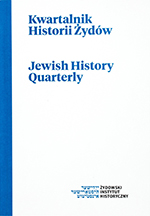Pokolenie Marca '68 na wygnaniu. Wzory integracji i zmiany identyfikacyjne
Generation of March ’68 in Exile: Patterns of Integration and Identification Shifts
Author(s): Marcin StarnawskiSubject(s): Political history, Social history, Jewish Thought and Philosophy, History of Judaism
Published by: Żydowski Instytut Historyczny
Keywords: assimilation/integration; diaspora; Jewish identity; March 1968 in Poland; migratory cultural capital; oral history
Summary/Abstract: The article addresses questions concerning individual experiences and group developments among post-March 1968 émigrés from Poland. While much is known about where these refugees migrated and that the experience of the anti-Jewish stigma has led to shifts in national identification, biographical and social dynamics behind these changes in lifelong perspective have not been a subject of many systematic studies. What did it mean to be an exiled victim of antisemitic hatred and political persecution? How were “Polish” and “Jewish” identification labels revalued in new geographical, political and (multi)cultural contexts? How did new countries and new societal settings foster or hinder a new sense of belonging and national attachment? How did the émigrés’ experiences and identification patterns evolve through different modes of integration in host societies, local Jewish communities as well as broader diasporic space, including links with Israel and Poland as well as generational reunion meetings? The qualitative analysis is based on selections from field material (biographic interviews conducted by the author in several countries between 2001 and 2017) as well as some published memoirs and interviews. The proposed approach links sociological framework of the diaspora and transnational studies with biographic perspectives drawn from oral histories. It highlights exiles’ typical experiences related to interplay of coercion, choice and migratory cultural capital at the point of exit, including anticipation of opportunities in potential countries of immigration. It also discusses some aspects of early adaptation, mid-term integration in new societies and local Jewish communities as well as re-establishing transnational and generational networks.
Journal: Kwartalnik Historii Żydów
- Issue Year: 270/2019
- Issue No: 02
- Page Range: 389-416
- Page Count: 28
- Language: Polish

